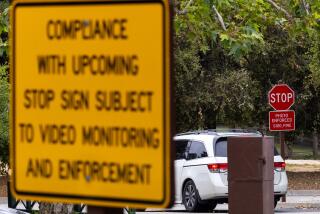Going Right by Coming Clean
- Share via
Martha Stewart got caught, and twice within the last month, I got caught ... rolling through the stop sign at Bagley Avenue and Oakmore Road in West L.A. Both times my 10-year-old son, Asher, was in the back seat.
I got ticketed the first time. The second time I said to the officer: “This is embarrassing but you caught me here doing the same thing two weeks ago. I’m really sorry. There’s no excuse. ... “
“Mr. Kaplan,” the officer said, “I don’t want to ding you twice. So I’m not going to ticket you. But if I catch you running this again, I’ll give you two tickets.”
I heartily agreed.
“I do this all the time,” I told Asher, “ ... don’t make complete stops.”
“Then how come you don’t get more tickets?” he asked.
“The policemen can’t be everywhere, so I’m just lucky that I don’t,” I replied.
That afternoon when I drove Asher home from school he noticed the small sign taped to the dashboard: NO BAGLEY. There is an easy way to avoid the stop-sign trap, and I explained I was going to do just that.
“Wouldn’t it just be better to stop at the stop signs?” he said.
“Yes,” I said, “but my mind wanders and I forget. But it’s wrong and there’s no excuse, so I better do better.”
Around the same time, Asher experienced a major flap at a sleepover. The other boy had offered to insert “cheat codes” to beef up Asher’s fighters in the Pokemon cartridge for his GameBoy Advance game machine, and Asher readily agreed. The codes ruined his game. The boy then said (Asher’s version anyway) that the same thing happened at summer camp; the codes ruined all the kids’ games but his. Asher lost it.
The following night, Asher called me crying hysterically. He could not get to sleep over the injustice that the boy had not told him about the problem before they tried the codes. I believed Asher when he explained that he would not have tried the codes if he had known the potential effect. The other boy maintained he had told Asher about the risk.
So I went several rounds of e-mail with the boy’s mom. She wanted the boys to work it out, as no parent had been there to witness what happened. I figured the boys had tried without success. My son lies like all kids, I explained, but in this case the greater likelihood was he was telling the truth. The mother asked what I wanted, and I said I wanted her son to pay for a used version of the game and to apologize.
A check came and the boy called and said he was sorry, but he acknowledged no fault.
“No boy would apologize unless his mom made him,” Asher told me. “Well, that’s the real lesson of all this,” I told him. “We make mistakes, sometimes on purpose, sometimes by accident. We’ve been watching the Martha Stewart mess on TV. Her career and a great deal of her life are ruined because she refused to admit she made a mistake. Look, I could have argued the second time with that police officer and told him I was sure I had made a complete stop. Then what would have happened?”
“A ticket.”
“Like with the ticket,” I said, “sometimes you get caught and it doesn’t matter if 10 other guys didn’t. It’s the way it is. If Martha Stewart would have told the authorities in the beginning that she had made a mistake and was wrong and was sorry, everything would have turned out much better for her. You will make mistakes and you will fare better and earn the respect of those around you if you just admit them.”
Asher was silent. But do I think something stuck? I hope so.
Howard Kaplan is the author of three novels.
More to Read
Go beyond the scoreboard
Get the latest on L.A.'s teams in the daily Sports Report newsletter.
You may occasionally receive promotional content from the Los Angeles Times.










